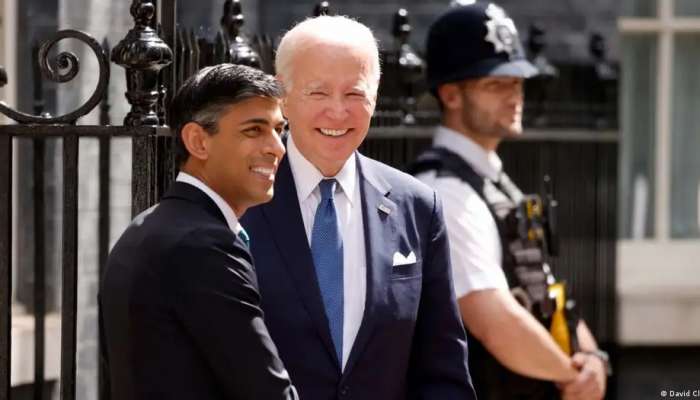
London: US President Joe Biden began his three-nation Europe trip after arriving in London on Sunday.
He met British Prime Minister Rishi Sunak at 10 Downing Street on Monday — his sixth meeting with the UK prime minister, which was believed to have touched on various global issues, including the war in Ukraine.
The pair have met regularly in recent months, seeking to repair ties that were strained under Sunak's predecessors — particularly in connection with the UK's post-Brexit trade arrangements in Northern Ireland.
London's relations with Irish-American Biden have since improved, particularly after Sunak struck a deal with the European Union about the movement of goods.
Biden told reporters in London that he "couldn't be meeting with a closer friend and greater ally."
"Our relationship is rock solid," he added.
The president then went on to visit King Charles III at Windsor Castle, flying from central London to the royal residence in his Marine One helicopter.
Having declined to attend Charles's coronation, instead being represented by his wife Jill Biden, the US president had promised the monarch that he would visit soon.
The talks with King Charles were expected to include climate initiatives.
Biden's agenda at the NATO summit
On Monday night, Biden will travel to Lithuanian capital Vilnius ahead of talks with NATO leaders slated for June 11 and 12.
Expected to be on the agenda are NATO's support for Kyiv, as well as Sweden's bid to join the alliance, which has so far been blocked by Turkey.
The Vilnius summit also comes after the Biden administration greenlit the delivery of cluster munitions to Ukraine, with some NATO allies such as the UK and Spain expressing concern about the move.
Sunak's spokesperson said the pair had discussed the issue while Biden was in London, acknowledging that providing the weapons "was a difficult choice for the US." It had been "forced on them by Russia's war of aggression," he added.
After his trip to Lithuania, Biden will head to Finland, which is the newest member of the NATO alliance.
What Biden said about Ukraine and NATO membership
The US president had cast doubt on the likelihood of Ukraine being offered NATO membership in comments to CNN.
"I don't think it's ready for membership in NATO," Biden told the US broadcaster in an interview aired Sunday.
Biden said that he hoped that NATO leaders would "lay out a rational path for Ukraine to be able to qualify to be able to get into NATO."
In order to join the military alliance, countries must "meet all the qualifications, from democratization to a whole range of other issues," Bioden emphasized. He added that bringing Ukraine into the alliance now would mean "war with Russia."
"I don't think there is unanimity in NATO about whether or not to bring Ukraine into the NATO family now, at this moment, in the middle of a war," he said.
Biden added that it will "take a while" for Ukraine to become a member of NATO.
However, Biden said that Washington could provide Kyiv with support similar to that it gives to Israel until Ukraine joins NATO.
"The United States would be ready to provide...security a la the security we provide for Israel." He said this involves "providing the weaponry they need, the capacity to defend themselves."
According to a recent report by the US Congressional Research Service, no other country in the world has received more US support than Israel since World War II.
Biden calls for Sweden in NATO during Erdogan call
Also on Sunday, the White House said that Biden expressed a desire for Sweden to join NATO "as soon as possible" in a phone call with Turkish President Tayyip Erdogan.
Sweden's NATO bid requires unanimous approval from all member states, including Turkey. On Thursday, Stockholm failed to convince Ankara to ratify Swedish accession to NATO in a foreign minister-level meeting.
Erdogan told Biden that Sweden had taken steps in the right direction for Turkey to support the bid, the Turkish presidency's communications directorate said in a separate statement on Sunday.
However, it said that the steps were not useful as Kurdistan Workers Party (PKK) supporters continued to hold demonstrations in Sweden.